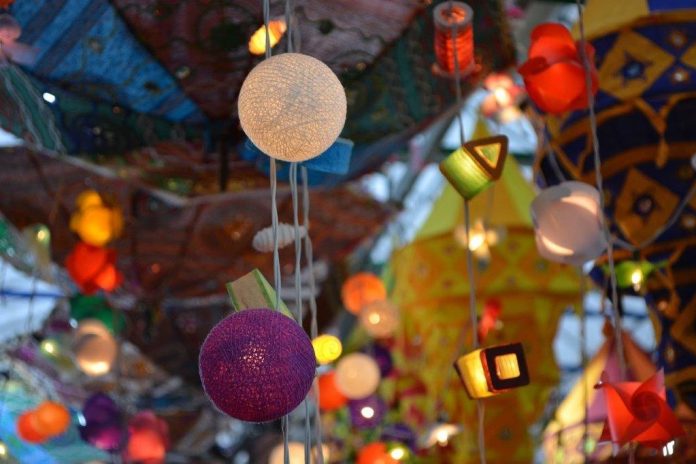By Radhika Mulastanam
The fragrance of sesame seed oil warmed together with betel nut leaves and carrom seeds tickles my nose as I sit in front of my mother feeling quite special. My mother puts a dab of Kumkum (vermillion) on my forehead and pours a few drops of the warm oil on my head and massages my scalp saying a hushed prayer. I am then hustled off to shower and wash my hair with sweet smelling shikakai powder. Right out of the shower, a spoonful of an herbal concoction is shoved into my mouth against my vehement protests, to aid in digestion, I was told. Adorned with my new clothes, twinkling gold earrings, and a string of heavenly jasmine flowers in my hair, I am ready for Diwali.
Celebrated to signify the killing of the demon Narakasura by Lord Krishna, the festival brings back so many fond memories of time spent bursting firecrackers, eating delicious food, and of course comparing my new clothes with that of my best friend. I still reminisce about the days spent visiting friends and families, getting cash from our elders and feeling ultra-rich for that one day, until we were forced to hand it over to our parents. Unspoken contests and vociferous conversations ensued on which house on the street had the best firecrackers, or woke up the earliest to start celebrations, and grudging respect doled out.
While the legend behind this Festival of Lights varies across the different regions in India, the underlying message is one of victory of light over darkness, good over evil and knowledge over ignorance. The days leading up to Diwali are spent cleaning the house and decorating to welcome the Goddess of Wealth and Prosperity. Rangoli, the rather complicated art of creating designs on the floor with dry rice flour, colored powders and petals and lighting up the house with ‘diyas’, small clay lamps filled with oil, are undertaken to prepare for the big day. The cities, towns and villages come alive in the weeks leading up to Diwali decorated with a zillion lights, shopping extravaganzas and the wonderful aromas of sweets and snacks in the air.
India is a land of diverse cultural and religious beliefs, but Diwali brings everyone together. People take delight in sharing food with friends and family and celebrating together. It is not uncommon for the kitchen to be filled with food from different neighbors and living rooms filled with laughter and conversations. Religious affiliations and beliefs blur and the sense of joy, hope and community pervade the days.
Diwali is celebrated over five days, with each day having special significance. It is also a period when businesses in some parts of the country close their books to begin a new year. Diwali sets the stage for a new start, inspiring people to embark on fresh journeys with hope and renewed enthusiasm.
In a world often divided by differences, Diwali’s luminous message transcends religious boundaries reminding us that the brilliance of love, hope and goodness knows no limits. As communities come together to celebrate this festival, it serves as a powerful beacon, illuminating the path towards unity and understanding. In the warm glow of Diwali, I look forward to carrying these timeless values forward, fostering harmony and embracing the diversity that enriches our shared experiences.
Flower Mound’s annual Diwali Celebration will be held on Saturday, Oct. 28, from 5 – 9 p.m. at Heritage Park, 600 Spinks Road.












.jpg)

.png)

